While traditional coaching approaches often focus solely on the mind, many clients need something more. Their challenges, trauma, and emotional patterns live in their bodies too, not just in their thoughts.
That’s where somatic coaching comes in.
By integrating body awareness with coaching techniques, somatic coaches help clients access deeper levels of transformation that talk-only approaches might miss. This powerful method taps into the body’s wisdom to create lasting change.
Whether you’re new to coaching or expanding your practice, somatic skills can improve your impact and support clients beyond conventional methods.
In this guide, we’ll explain everything you need to know about becoming a somatic coach, from understanding the fundamentals to launching your practice.
[ Read: 12 Types Of Coaches and How They Win Clients In Their Niches ]
What is Somatic Coaching?
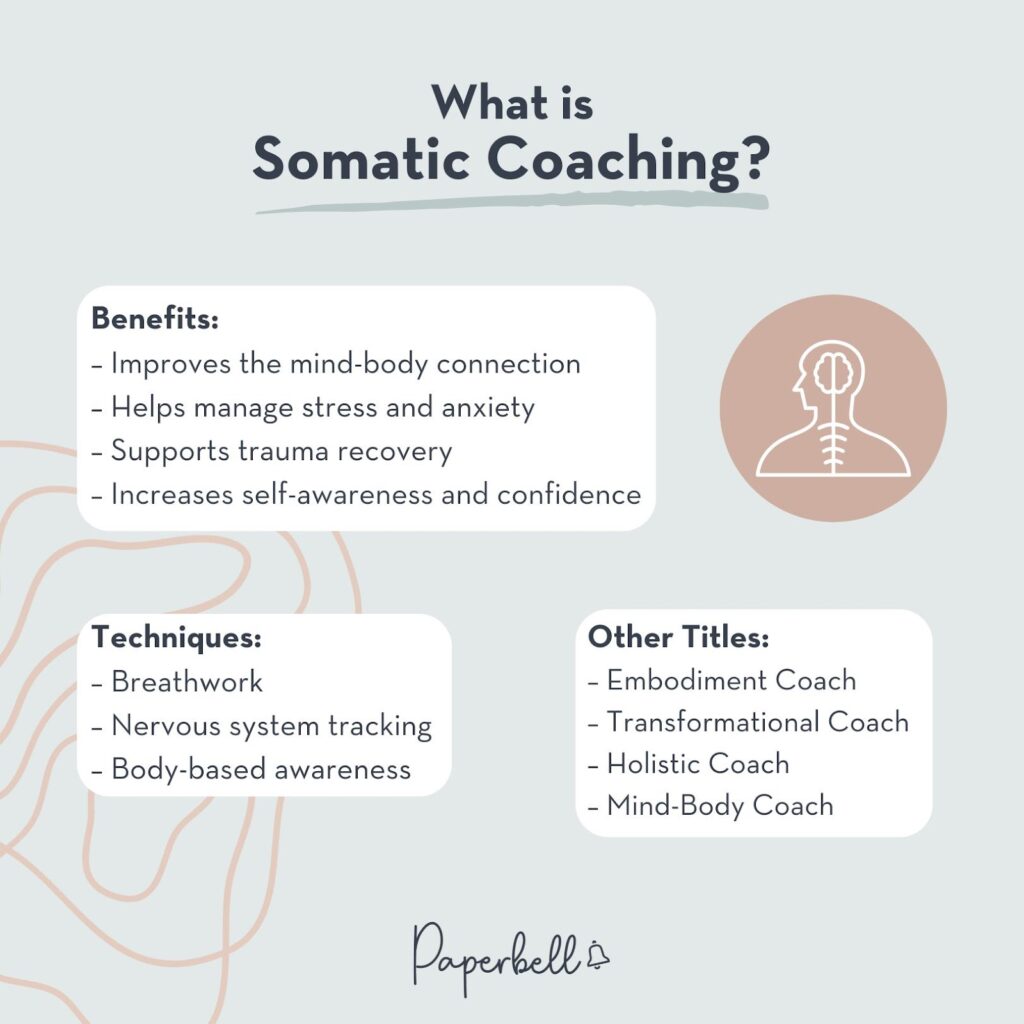
Somatic coaching integrates the body into the coaching process, focusing on bodily sensations, movement, and physical experiences.
Beyond just intellectual coaching techniques, a somatic coach helps their clients create a mind-body connection. They use a somatic approach that involves techniques like breathing that focus on the internal experience, nervous system regulation tracking, and regulate the nervous system.
This helps clients understand how physical sensations and movements influence their emotions and behavior. Using these insights, clients can face emotional challenges, manage stress and anxiety, and resolve trauma in their lives. Some positive side effects of this work are greater emotional intelligence, self-awareness, and more confidence.
Sometimes, somatic coaches might use other titles, such as:
- Embodiment Coach
- Transformational Coach
- Holistic Coach
- Mind-Body Coach
Somatic Coaching Techniques Focusing on the Physical Body
All of these professionals focus on achieving growth and healing through a whole-body experience. They may use different coaching methods, including the following:
- Mindfulness and meditation practices
- Breathwork
- Movement practices like tai chi, dance, qi gong, and yoga
- Body awareness and grounding techniques
- Alternative healing practices like aromatherapy, massage, or reiki
Some coaches incorporate movement pain integration elements to enhance personal transformation and client support.
Each somatic coach uses their own methods depending on where they were trained and what approaches they believe in. Not all clients were created equal, and one somatic session might differ from another depending on which practices the coach is strongest at.
Some coaches focus more on scientific principles, while others work more with alternative healing modalities. Though they may take a different route to achieving results, they all apply body-oriented coaching in their practice.
Is Somatic Coaching for Me?
Somatic coaching is not for everyone. It’s a complex and delicate area of coaching where you need to deal with sensitive issues and often uncover high-level trauma in your clients. It can even be triggering for some coaches if they’ve not done similar work on themselves first. Here are a few ways you can tell this approach is for you:
- You’re inclined towards a holistic approach to healing and growth.
- You’re comfortable guiding clients through practices focusing on bodily sensations and movement, which are essential components of a thriving coaching practice.
- You can confidently create a safe space for your clients where they can open up about deep-seated issues or trauma.
- You prefer a flexible coaching approach based on your clients’ needs that involves several techniques and healing modalities instead of a linear, step-by-step process.
- You believe in the importance of physical experiences to create emotional well-being.
How to Become a Somatic Coach
You don’t necessarily have to be certified to become a somatic coach, but you do require proper training to use somatic approaches and healing modalities in your practice.
Several training and certification programs created for somatic coaches combine the latest science and ancient healing methods in their curriculum. Among these, a comprehensive somatic coaching program stands out for its pioneering status and extensive curriculum. Though their program structure and fees largely differ, they all provide something unique to advance your career, depending on your expectations.
We’ve gathered some comprehensive and specialized somatic coach courses and certification programs below. These can arm you with the practical coaching abilities and somatic perspective you need to help your clients heal and thrive.
While training is a great first step, there are a few other things to keep in mind when launching a successful coaching business. We recommend reading our 7-step guide to starting a life coaching business to get up to speed.
Specialized Somatic Coach Training Programs
Breathwork Instructor Training by SOMA Breath

SOMA Breath is a holistic health education platform that teaches breathwork, meditation, music therapy, and neurosomatics. These methods are rooted in science and are currently studied at Cambridge University.
SOMA Breath is run by Niraj Naik, a certified pharmacist turned holistic health and breathwork expert. The team also runs an online community of breathwork practitioners and instructors from around the world.
One of the things that’s unique about SOMA Breath is their signature breath-entrainment music. They produce their own meditation sounds with isochronic tones and trypnaural beats that instructors can use to create deeper experiences for their clients. As a SOMA Breath certified instructor, you can also be featured in their directory of breathwork instructors after your training.
SOMA Breath provides specialized, science-based training on three different levels, and each level can be completed in a few weeks.
Neurobiology Courses by NICABM
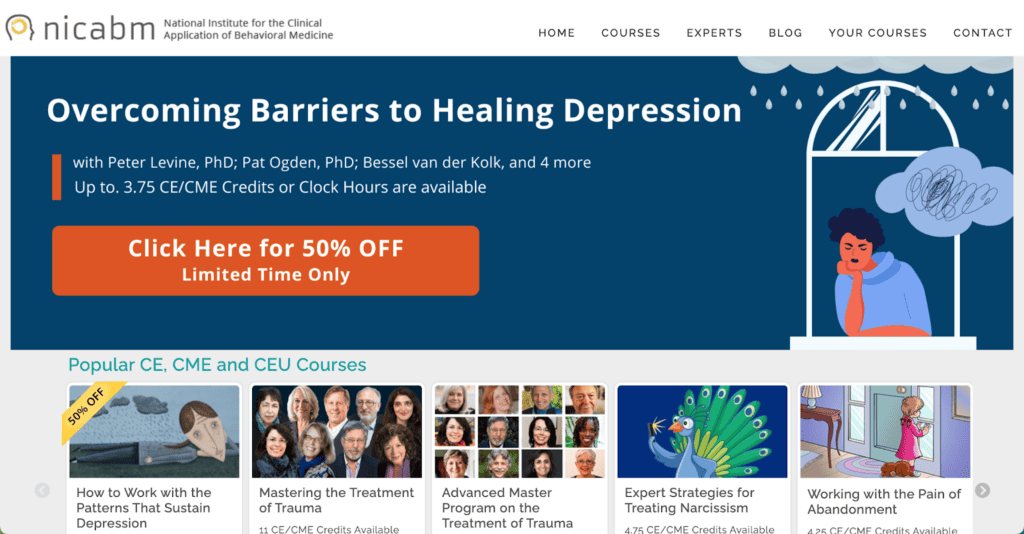
The National Institute for the Clinical Application of Behavioral Medicine (NICABM) has online training programs on a wide range of nuanced topics, such as racism-based trauma and dealing with shame. More than a million health and mental health practitioners have taken these courses to help their clients manage mental health issues and improve their emotional well-being.
Training instructors include some of the biggest names in the field, including Peter Levins, PhD, Founder of Somatic Experiencing, and Bessel van der Kolk, MD, author of the international bestseller The Body Keeps The Score. These experts are pioneers in healing trauma with scientifically proven somatic practices, so learning from them gives you a huge advantage as a coach (even if you’re not a trained health practitioner yourself.)
Course fees at NICABM range from $100 to $600, and their training videos can be completed in a few hours at your own pace.
Dance Academy by the FICHO Institute
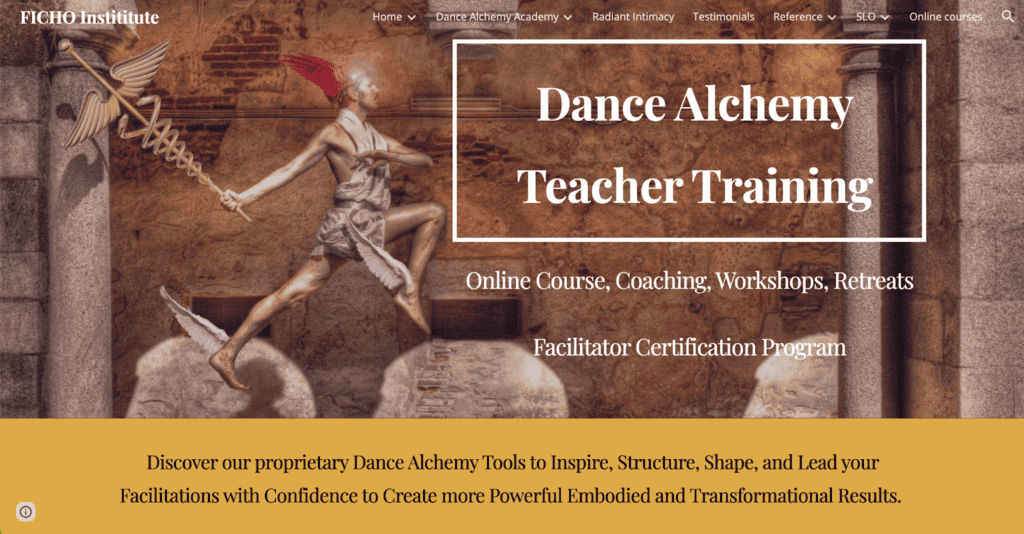
The FICHO Institute offers a dance and movement-based facilitator training program led by Holistic Dance Teacher and Embodied Leadership Coach, Goran Bogdanovski. He has vast experience working with dance as an art form and a healing modality. He combines yoga, martial arts, shamanism, and other transformative practices in his coaching work.
At the Dance Academy, you can learn 70+ tools and exercises through 70 training videos focusing on dance improvisation, therapy, and body-mind-spirit connection. As a somatic, embodiment, or transformational coach, you’ll also learn an 8-step structure to facilitate impactful individual and group client sessions.
You can take the program as an online self-study course for $800 or apply for 1-on-1 facilitator coaching with Goran at a custom rate.
Comprehensive Somatic Coaching Certifications
Integrative Somatic Practitioner Certification Course at IWA
The Integrative Wellness Academy (IWA) offers one of the most comprehensive certification programs for somatic coaching. From spiritual energy systems to quantum physics, these training modules look at how the mind, body, heart, and spirit connect and how you can look at client issues holistically.
Some of the somatic coaching techniques and systems they touch upon are:
- Aromatherapy
- Bilateral music
- The chakra system
- Mindfulness
- The Hug method
- Somatic dance
- Movement and breath
- Journaling
Besides coaching tools, they also educate their students on important aspects of this field, such as informed consent, boundaries, and safe touch.
You can complete this certification program online for $1200 in around 55-60 hours spread over 6 months.
Somatic Experience Training at SOS Internationale
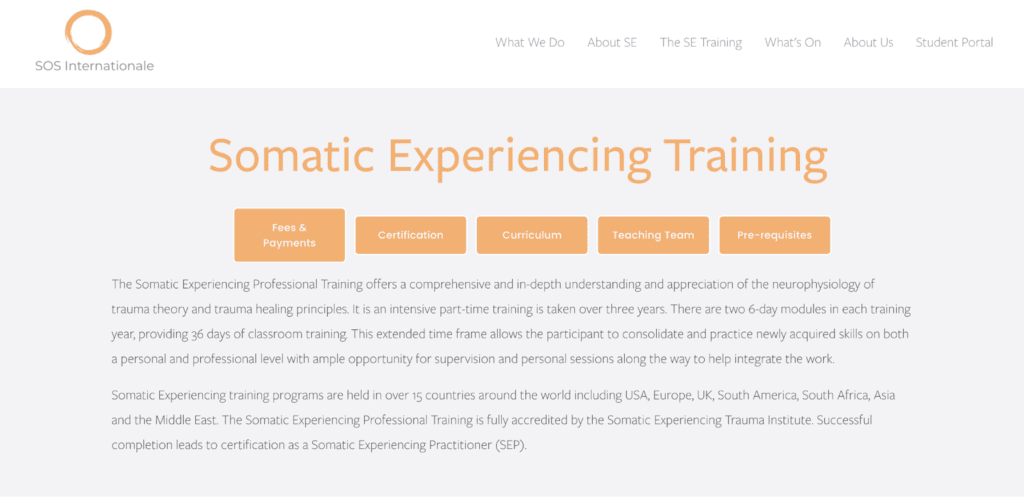
The Somatic Experiencing Training at SOS Internationale is based on the research of Peter Levins, PhD, and is accredited by the Somatic Experiencing Trauma Institute. You can find training programs at SOSI in 15 different countries around the world. It takes three years to complete the program and provides certification as a Somatic Experiencing Practitioner (SEP).
Their curriculum spreads over three years with 72 training hours per year. Though you don’t have to be a medical or alternative medicine professional to apply, there’s quite a rigorous application process.
The organization emphasizes that it’s not a personal self-help course but a formal training for professionals to help clients deal with trauma with a somatic approach. Because of the nature and depth of this work, participants must also complete personal and supervision sessions to gain first-hand experience before completing the program.
Though not a small commitment in time and finances (around $4500), this certification program provides deep knowledge and esteemed qualifications. Besides the three-year Somatic Experiencing training, SOS Internationale also offers short workshops and Master Classes focusing on specific trauma-related skills.
Accredited Diploma in Body-Oriented Coaching by The Somatic School
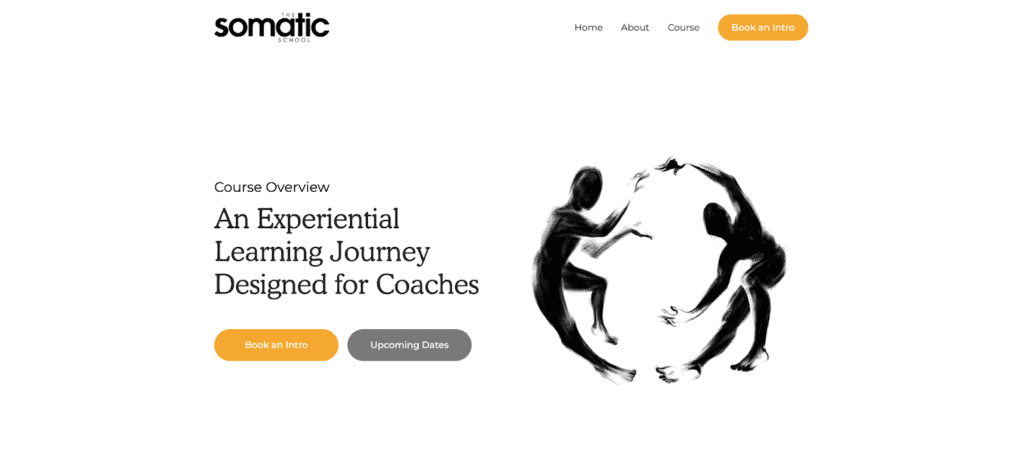
The Somatic School provides body-oriented coaching training that can be completed fully online in 6 months. It’s the world’s first somatic coach training to be awarded a Level 2 accreditation by the International Coaching Federation (ICF). So, if you’re looking for a certification that will earn you ICF qualifications (and you’re ready to log 500 hours of coaching experience), this could be a great option.
The training focuses on the Cross-Mapping Method and Sensation-Based Motivation Coaching. These methods combine mindfulness, energy medicine, and neuroscience to achieve holistic change in clients. They impact their physical body, mental and emotional health, and spiritual awareness all at once by:
- Releasing negative emotions
- Healing chronic pain and health conditions
- Connecting with their sense of purpose and intuition
The certification program is open for professional coaches, therapists, and counselors who want to specialize in body-oriented coaching work. The tuition fee is around $6650, and the program can be completed on weekends online.
Certification Program by Somatic Experiencing International
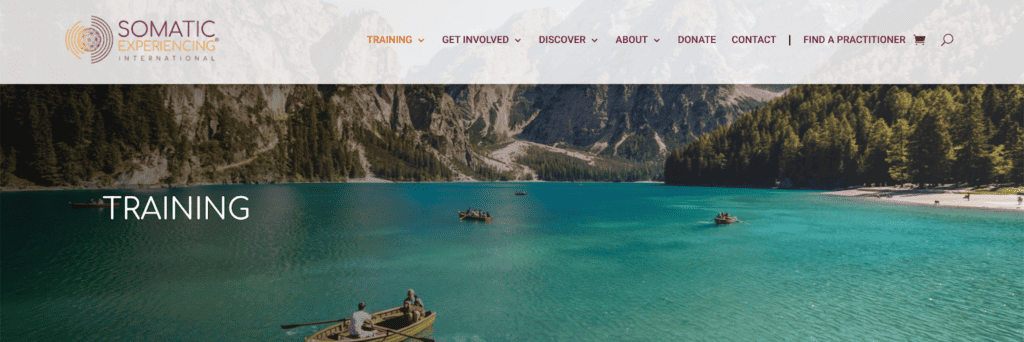
Somatic Experiencing International is another esteemed organization that teaches the life’s work of Peter Levine, PhD. You can apply for their training in various locations around the globe and complete their 8-module curriculum in three years to become a certified Somatic Experiencing® Practitioner (SEP).
The program combines various scientific fields, including:
- Physiology
- Psychology
- Ethology
- Biology
- Neuroscience
- Indigenous healing practices
As with most somatic coaching training programs, lectures at the Somatic Experiencing International focus on trauma healing through various somatic methods. They aim to release the physical tension and its psychological impact on clients caused by trauma.
The complete training costs $9530 for all eight modules, around $1000-$1,500 each.
Somatic Coaching Certification at the Strozzi Institute
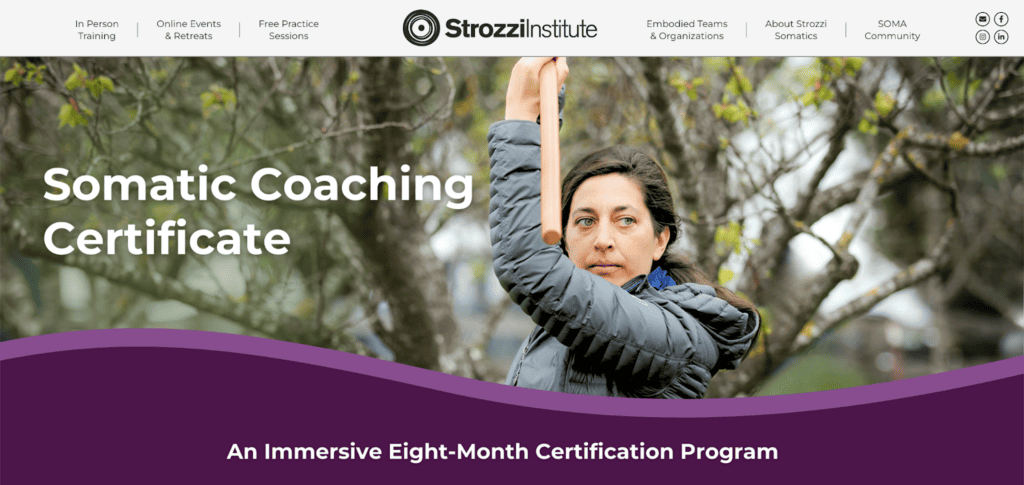
The Strozzi Institute has various cohorts starting year-round in both US and European locations. The somatic coach certification program at the Strozzi Institute takes eight months to complete and it can earn you a Level 2 accreditation with the International Coaching Federation (ICF).
Besides the practical training of 150 contact hours, you’ll also participate in:
- Four 4-day retreats
- One-on-one mentor coaching
- Mentoring groups
- Webinars and online learning
You’ll study with the same group of coaching students in person for eight months. This will allow you to exchange insights with your peers and establish connections with other somatic coaches. Tuition fees are around $13,000-15,000 depending on location.
Taking the Next Step in Your Somatic Coaching Journey
Becoming a somatic coach offers a powerful way to help clients create lasting change by integrating body wisdom with traditional coaching approaches. The journey requires dedicated training, personal embodiment practices, and continuous growth.
As you build your practice, remember that managing the business side is just as important as developing your coaching skills. Many coaches find themselves overwhelmed by scheduling, contracts, payments, and client organization.
That’s where Paperbell comes in. This all-in-one platform was designed specifically for coaches, handling everything from scheduling and payments to contracts and communications. With the administrative load lifted, you can focus on being fully present with your clients and facilitating powerful somatic transformations.
Ready to streamline your coaching business? Try Paperbell for free with your first client and experience how much easier practice management can be.

Editor’s Note: This post was originally published on Feb. 2024 and has since been updated for accuracy.









